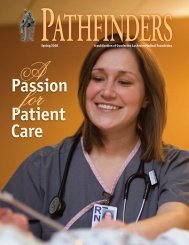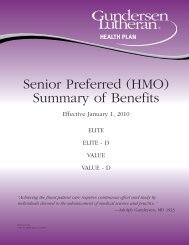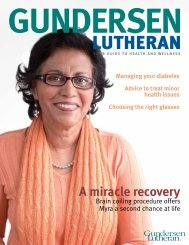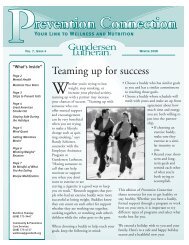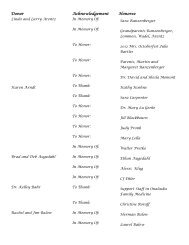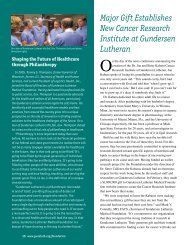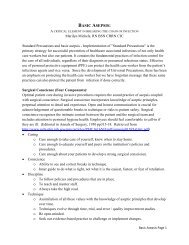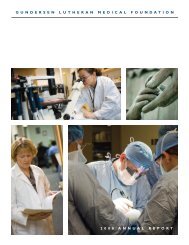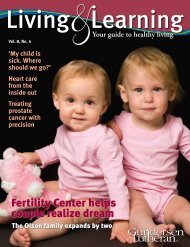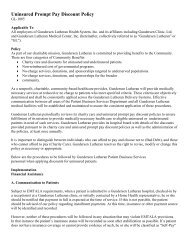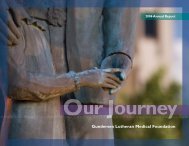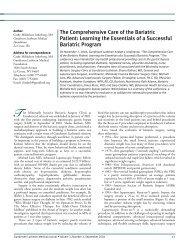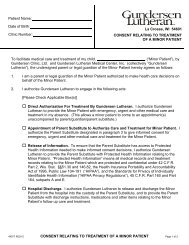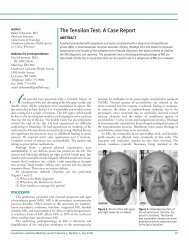Streptococcus bovis - Gundersen Lutheran Health System
Streptococcus bovis - Gundersen Lutheran Health System
Streptococcus bovis - Gundersen Lutheran Health System
You also want an ePaper? Increase the reach of your titles
YUMPU automatically turns print PDFs into web optimized ePapers that Google loves.
Authors:<br />
Glenn Wright, PhD<br />
John P. Porcari, PhD, RCEP<br />
Carl C. Foster, PhD<br />
Heidi Felker, MS<br />
Ashley Kosholek, MS<br />
Jennifer Otto, MS<br />
Erik M. Sorenson, MS<br />
Brian E. Udermann, PhD, ATC,<br />
FACSM<br />
Department of Exercise and<br />
Sport Science<br />
University of Wisconsin–La Crossse<br />
Address for correspondence:<br />
Glenn Wright, PhD<br />
Department of Exercise and<br />
Sport Science<br />
University of Wisconsin–La Crossse<br />
1725 State Street<br />
La Crosse, WI 54601<br />
email: wright.glen@uwlax.edu<br />
Placebo Effects on Exercise Performance<br />
AbStrACt<br />
The concept of controlling for placebo effects during<br />
experimental and clinical intervention studies is well<br />
established. The power of the placebo effect has been recognized<br />
in the literature, with the general expectation that about 33% of<br />
experimental subjects or patients will respond solely on the basis of<br />
the placebo effect. 1 Well-documented effects related to subjective<br />
outcome measures, 2 depression, 3 pain relief, 4 symptom relief, 5,6<br />
blood pressure reduction, 7 and asthma relief 8 have been reported.<br />
Although virtually all exercise intervention studies include control<br />
groups to account for the placebo effect, data documenting the<br />
magnitude of the placebo effect during exercise are limited.<br />
Accordingly, the purpose of this study was to assess the magnitude<br />
of the placebo effect during exercise, with particular reference to<br />
the type of exercise (aerobic vs anaerobic) and exerciser (athletes,<br />
healthy nonathletes, patients).<br />
MethodS<br />
Approach to the Problem<br />
This study was designed to test the hypothesis that there would<br />
be a significant placebo effect during exercise in different types of<br />
exercise and in different types of exercisers. It was conducted in 3<br />
distinct parts. In all parts of the study, subjects provided written<br />
informed consent, and the study protocols had been approved by<br />
the university Institutional Review Board. In all parts of the study,<br />
the subjects had performed a practice trial of the criterion task to<br />
ensure that they were fully task habituated. Placebo and control<br />
studies were performed in random order with ≥ 48 hours without<br />
heavy exercise prior to each trial.<br />
Despite the routine use of placebo control in exercise intervention studies, there is inadequate<br />
information about the magnitude of the placebo effect and how it might respond during<br />
different types of exercise. This study was designed to evaluate the placebo effect in different<br />
populations and in different types of exercise. In a 3-part study the effect of purported<br />
nutritional ergogenic aids was measured in: (A) trained runners in a 5-km time trial, (B) physical<br />
education students during a high-intensity cycle sprint test, and (C) in clinically stable patients<br />
during a 6-minute walk test. In A, performance was improved by 83 seconds (6.5%), with a<br />
larger placebo effect in the slower runners. In B, there was no significant effect on peak or mean<br />
power output, or on the pattern of fatigue. In C, although there was no significant difference<br />
in the distance completed in the 6-minute walk test, there was a significant trend (P = .08) for<br />
patients to walk faster during the first minute of the test. The results suggest that the placebo<br />
effect may be of significant magnitude, particularly during more prolonged tasks, and may<br />
influence both athletes and patients.<br />
9 -14<br />
SubJeCtS<br />
In Part A, healthy, well-trained competitive runners ranging<br />
from university to recreational class (23 men, mean [SD] age 28<br />
[13] years; 9 women, mean [SD] age 30 [13] years) were studied<br />
during 5-km running time trials. In Part B, healthy physical<br />
education students (8 men, mean [SD] age 20 [1] years; 10<br />
women, mean [SD] age 21 [1] years) were studied during highintensity<br />
sprint cycling (Wingate Test). In Part C, patients with<br />
stable cardiovascular disease who were participants for longer than<br />
1 year in a community-based exercise program (6 men, mean [SD]<br />
age 62 [10] years; 4 women, mean [SD] age 64 [8] years) were<br />
studied while performing the 6-minute walk test.<br />
proCedureS<br />
In all 3 parts of the study, subjects were intentionally<br />
misinformed of the purported beneficial effects of the placebo agent<br />
by having them view a video (Part A = super-oxygenated water), by<br />
having them attend a graduate class on ergogenic aids (Part B = fastacting<br />
creatine monohydrate), or by having them read a brochure<br />
purporting to report results of previous studies (Part C = Peligrino<br />
Spa water). In all cases, subjects were given an inactive agent (tap<br />
water) in both the placebo and control conditions. We deliberately<br />
let the subjects know when they were receiving the “active” agent,<br />
so that they would be expecting an ergogenic benefit. Polling of the<br />
subjects indicated that they generally felt that the “active” agent (ie,<br />
placebo) was likely to help their performance.<br />
In Part A, the subjects ran two 5-km time trials (running<br />
without the benefit of other competitors) on an indoor 200-m<br />
track. The warm-up before each run was based on the normal pre-<br />
<strong>Gundersen</strong> <strong>Lutheran</strong> Medical Journal • Volume 6, Number 1, June 2009 3



